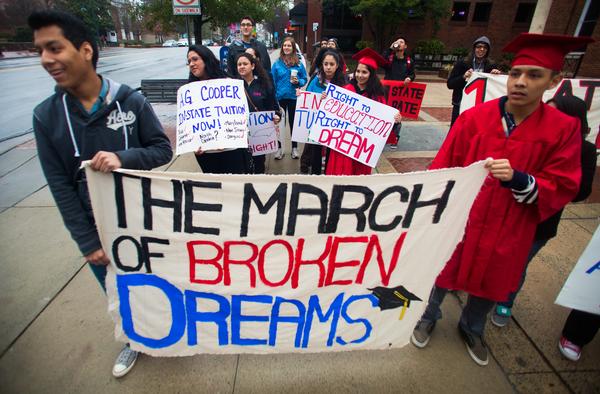Education is one of the critical issues of our time. How we as a society choose to invest in our young people has dramatic implications for our future. Today, thousands of immigrant youth stand at the intersection of our broken immigration policies and our educational system, hoping for and working toward a better future.
Undocumented young people – many of whom only speak English and are American in every way but paperwork – have to pay out-of-state tuition at North Carolina’s public colleges and universities. This policy puts higher education essentially out of reach for these students. For example, out-of-state tuition for a year of community college is over $8,000, while at UNC-Chapel Hill it’s over $30,000 per year.
Undocumented North Carolina residents shouldn’t have to pay out-of-state tuition. A recent article in The Chapel Hill News states: “It is important to remember that undocumented students are undocumented through no fault of their own. They arrived as young children with their parents, have been educated in U.S. schools, are members of our communities and have dreams of working for their country.
“Beyond its moral value, in-state tuition is also an economic development issue. Many opponents argue that making more students eligible for in-state tuition would detract from benefits for citizen applicants and place a higher financial burden on the state. But according to the National Immigration Law Center, in states that have passed in-state tuition for undocumented students, the percentage of high school graduates who pursue a college degree has risen – which results in increased revenue from tuition payments.”
Fortunately, many young people and friendly organizations are working to change this unjust policy.
The Durham Herald-Sun covered a recent event by members of the NC DREAM Team who are marching from Chapel Hill to Raleigh:
CHAPEL HILL — Through the fog and drizzle, young activists showed up at the steps of the Franklin Street post office, passing out signs that read, “Right to Education, Right to Dream” and “AG Cooper, In-State Tuition Now!”
The morning marchers were leading the North Carolina “One State, One Rate” campaign for in-state tuition for undocumented students. As state law stands now, an undocumented student attending a North Carolina university or college must pay out-of-state tuition.
But the N.C. Dream Team, an organization of undocumented youth and allies fighting for immigrant rights, argue that a clarification to North Carolina law would allow undocumented students to attend school at more affordable rates.
Since the fall semester, young activists have pushed Attorney General Roy Cooper to side with their efforts. They say that have gotten little to no response from his office, and the University of North Carolina system and N.C. Community College System have issued responses, saying they cannot act on this issue until change is made from within the N.C. General Assembly.
In addition to the NC DREAM Team, a statewide coalition called “Let’s Learn NC” has been working for over a year to introduce legislation and encourage support for tuition equality across North Carolina. We encourage you to connect with both groups and lend your voice to the fight for fairness in how tuition is charged.
One state, one rate for North Carolina.

